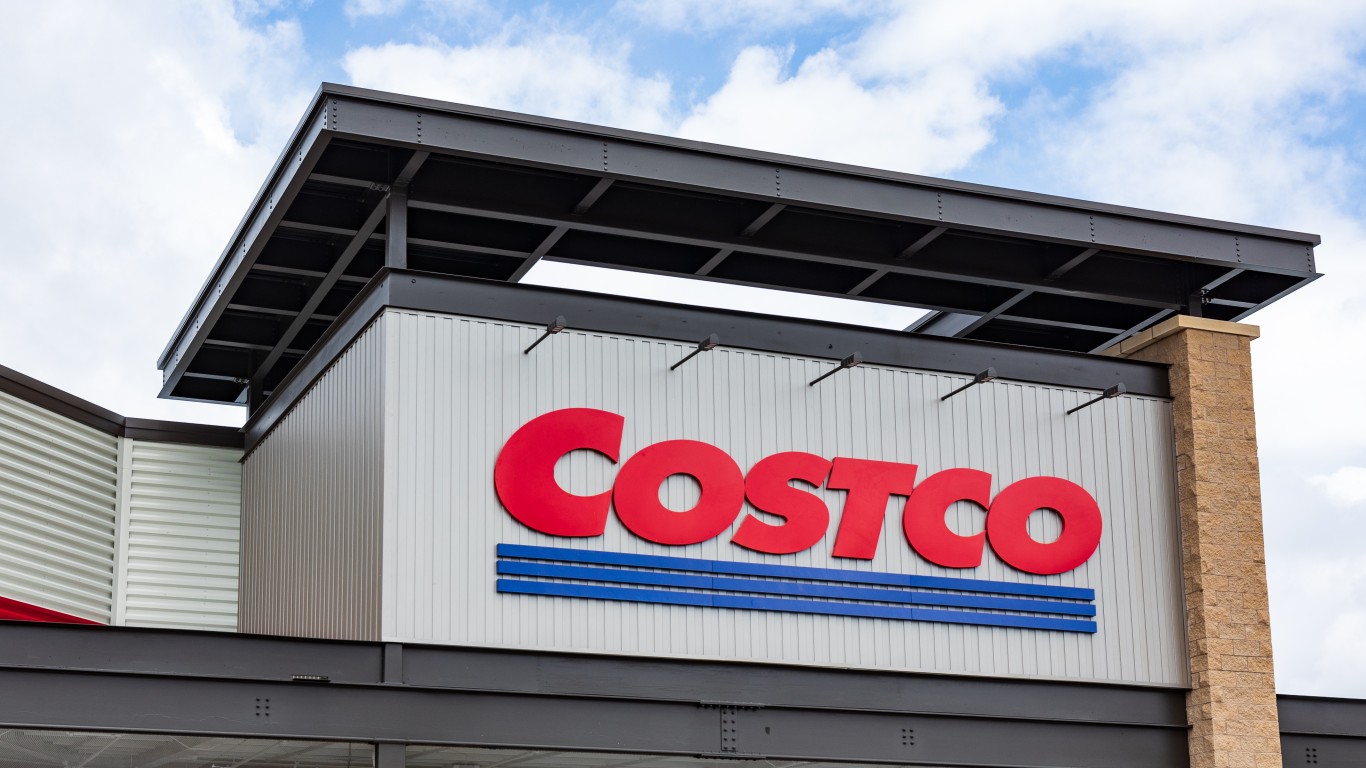
Dollar General Corp. (NYSE: DG) and Dollar Tree Inc. (NASDAQ: DLTR) both reported earnings before the markets opened on Thursday. The rivalry is continuing between these two, but there is no clear winner yet. Although Dollar Tree won the Family Dollar acquisition, it wasn’t enough to win the quarter. After the companies reported, analysts took the opportunity to reevaluate how they view these dollar stores, and the consensus was not exactly favorable.
24/7 Wall St. has included highlights from each of the earnings reports, as well as the analysts’ commentary after the fact.
Dollar General said that it had $1.08 in earnings per share (EPS) on $5.39 billion in revenue. The consensus estimates from Thomson Reuters had called for $1.09 in EPS on $5.5 billion in revenue. In the same period of last year, Dollar General posted EPS of $0.95 and revenue of $5.1 billion.
Same-store sales increased 0.7%, driven primarily by an increase in average transaction amount, offset by a decline in traffic. Same-store sales increases were driven by positive results in the consumables category, accompanied by results in the seasonal category that were flat when compared to the 2015 second quarter, offset by negative results in the apparel and home categories.
In terms of guidance for the fiscal year, the company expects to have EPS growth in the range of 10% to 15% and capital expenditures in the range of $580 million to $630 million. The consensus estimates for the full year call for $4.64 in EPS (compared with $3.96 in EPS in the previous year) on $22.41 billion in revenue.
Credit Suisse took an on-the-fence perspective and downgraded Dollar General stock to a Neutral rating and lowered its price target to $80 from $85. In the report the firm detailed:
Dollar General’s impressive stock run looks to be over sooner than we anticipated, as Q2 results signal a material deceleration in earnings momentum. Bottom line performance was only a touch below consensus, but a comp miss on negative traffic was a clear disappointment. A solid gross margin, expense control and lower tax rate made up for most of the shortfall. The company highlighted weather, food deflation, and SNAP as the largest top line issues, but commentary about intensifying competition from other staples players (likely includes Wal-Mart) was notable and its clear underlying business momentum has slowed. Visibility on a reacceleration is low in our view, even with the company poised to react with its own price cuts. This development adds to the recently introduced incremental wage pressure from new overtime rules, and combined now creates visible downside risk to forward consensus estimates. We expect these headwinds to weigh on the stock, making Outperformance to the staples group unlikely.
Merrill Lynch was more positive in its assessment. The brokerage firm maintained a Buy rating with a $95 price target, seeing this decline as an overreaction given that EPS grew by 13% and guidance was maintained. The firm argues that the miss on comps was driven by deflation, a reduction in SNAP, a mild spring and intense promotional environment. However the company did trim its EPS growth forecasts for 2016 to 2018, down to 17%, 12% and 14% respectively.
A few other analysts also gave their two cents on Dollar General:
- BMO downgraded it to Market Perform from Outperform and cut its price target to $78 from $95.
- Goldman Sachs has a Buy rating and lowered its price target to $89 from $97.
- Jefferies has a Hold rating and cut its price target to $78 from $96.
- Raymond James cut its price target to $95 from $105.
- RBC has an Outperform rating and lowered its price target to $90 from $103.
- S&P Global maintained a Buy rating with an $85 price target.
- Telsey Advisory downgraded it to Market Perform from Outperform and cut its price target to $84 from $102.
- UBS has a Buy rating and lowered its price target to $92 from $101.
Dollar Tree posted $0.72 in EPS on $5.00 billion in revenue, compared to the consensus estimates of $0.73 in EPS on revenue of $5.09 billion. In the same period of last year, Dollar Tree posted EPS of $0.25 and revenue of $3.01 billion.
The $2 billion increase in revenue was the result of an incremental $1.8 billion in net sales from Family Dollar stores, sales from new Dollar Tree stores and a 1.2% same-store sales increase on a constant currency basis. Same-store sales increased 2.7%, on a constant currency basis, in the prior-year period. Adjusted for the impact of Canadian currency fluctuations, the same-store sales increase was 1.1% for the second quarter.
In terms of the outlook for the fiscal third quarter, the company expects to have EPS in the range of $0.76 to $0.82 and net sales in the range of $5.02 billion to $5.10 billion, based on a low single-digit increase in same-store sales. The consensus estimates are $0.76 in EPS on $5.13 billion in revenue.
Credit Suisse saw Dollar Tree’s earnings as disappointing as industry fundamentals appear to be deteriorating and there is still no real evidence of a turnaround at Family Dollar. The firm continued with its Underperform rating and $76 price target. Credit Suisse noted in its report:
Earnings were roughly in-line with expectations and at the high end of guidance, but comps fell short of at both Dollar Tree and Family Dollar. The calendar may have played some role, but there is also real evidence of slowing demand, intensifying competition, and an overall lack of any improvement in momentum at Family Dollar. While the segment’s EBIT contribution was about as we expected despite weak sales and management’s commentary on synergies remained good, a lack of improvement in sales at Family Dollar is concerning given that the gap to Dollar General is productivity-based. Visibility on a near-term improvement is low, especially with Dollar General and other staples players like Wal-Mart focused on lowering prices. We remain concerned about the market’s high expectations around this deal and cautious overall on the stock. Weakening industry trends now create further incremental risk.
Merrill Lynch again took the more positive view on the stock. The firm reiterated a Buy rating with a $105 price objective, as it continues to see Dollar Tree as one of the best multiyear growth stories. Merrill Lynch views the share price pressure today as an overreaction to a comp miss and concerns over competition and low end consumers.
Other analysts weighed in on Dollar Tree:
- Feltl and Company Research has a Buy rating and raised its price target to $101.20 from $97.25.
- JPMorgan cut its price target to $104 from $105.
- UBS has a Buy rating and lowered its price target to $100 from $108.
- S&P Global maintained a Sell rating with an $84 price target.
Shares of Dollar General closed trading at $75.50 on Friday. The stock has a consensus analyst price target of $97.14 and a 52-week trading range of $59.75 to $96.88.
Dollar Tree shares closed at $85.50, with a consensus price target of $97.86 and a 52-week range of $60.31 to $99.93.
Are You Ahead, or Behind on Retirement? (sponsor)
If you’re one of the over 4 Million Americans set to retire this year, you may want to pay attention.
Finding a financial advisor who puts your interest first can be the difference between a rich retirement and barely getting by, and today it’s easier than ever. SmartAsset’s free tool matches you with up to three fiduciary financial advisors that serve your area in minutes. Each advisor has been carefully vetted, and must act in your best interests. Start your search now.
Don’t waste another minute; get started right here and help your retirement dreams become a retirement reality.
Thank you for reading! Have some feedback for us?
Contact the 24/7 Wall St. editorial team.



